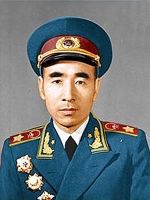| Last Name: | 林 |
| First Name: | 育蓉 |
| Name and Alias: | 阳春 |
| Web/Pen/Nick Name: | 育容 |
| Birth Place: | 大清湖北省黄冈县回龙山镇林家大湾村 |
| Death Place: | 蒙古人民共和国肯特省温都尔汗 |
| | |
Lin abstained from taking an active role in politics after the civil war ceased in 1949. He led a section of the government's civil bureaucracy as one of the co-serving Vice Premiers of the People's Republic of China from 1954 onwards, becoming First Vice Premier from 1964. Lin became more active in politics when named one of the co-serving Vice Chairmen of the Communist Party of China in 1958. He held the three responsibilities of Vice Premier, Vice Chairman and Minister of National Defense from 1959 onwards. To date, Lin is the longest serving Minister of National Defence of the People's Republic of China. Lin became instrumental in creating the foundations for Mao Zedong's cult of personality in the early 1960s, and was rewarded for his service in the Cultural Revolution by being named Mao's designated successor as the sole Vice Chairman of the Communist Party of China, from 1966 until his death.
Lin died on September 13, 1971, when a Hawker Siddeley Trident he was aboard crashed in Öndörkhaan in Mongolia. The exact events of this "Lin Biao incident" have been a source of speculation ever since. The Chinese government's official explanation is that Lin and his family attempted to flee following a botched coup against Mao. Others have argued that they fled out of fear they would be purged, as Lin's relationship with other Communist Party leaders had soured in the final few years of his life. Following Lin's death, he was officially condemned as a traitor by the Communist Party. Since the late 1970s, Lin and Mao's wife Jiang Qing (along with the other members of the Gang of Four) have been labeled the two major "counter-revolutionary forces" of the Cultural Revolution, receiving official blame from the Chinese government for the worst excesses of that period.
